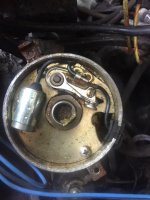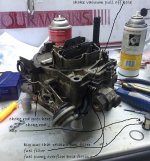You are using an out of date browser. It may not display this or other websites correctly.
You should upgrade or use an alternative browser.
You should upgrade or use an alternative browser.
Right to repair
- Thread starter pdecat
- Start date
- Joined
- Sep 16, 2003
- RO Number
- 12212
- Messages
- 12,004
With all marine engines going electronic and requiring proprietary software, I think it s only a matter of time till the same happens in the marine world
that said I don’t think the relationship between manufacturer and dealer is as tight in the marine industry as it is on land so manufacturers don’t have much of an interest in protecting the dealers.
that said I don’t think the relationship between manufacturer and dealer is as tight in the marine industry as it is on land so manufacturers don’t have much of an interest in protecting the dealers.
I don't see how manufacturers could be obligated to divulge information about their engines, especially electronics and software or firmware.Engine makers are restricting the necessary information to repair and adjust to their dealers for tractors and cars. Thus making it very difficult for independent shops to do work.
Has that affected boat owners?
- Joined
- Jan 1, 2000
- RO Number
- 385
- Messages
- 2,808
Magnusson-Moss Act and anti-trust coupled together make it a hey day for lawyers. In addition, the entire idea of "right to repair" is politically a winner and manufacturers who oppose it will lose badly. Already MA has passed ballot initiatives and it will only expand. Restrictions will not hold up. Better to sell information and diagnostic equipment than to hold it in-house.
- Joined
- Jan 1, 2000
- RO Number
- 385
- Messages
- 2,808
No one is saying they have to give it away for free. They can charge a reasonable fee for repair data. I for instance just paid 400 dollars for a factory repair manual and parts manual for my airplane.
Look, when you buy a product, title passes to the purchaser. If a company wants to control the repair of that product, they need to lease, not sell title to the product. Once they sell title, the purchaser entitled to do with that product what they wish. Which means if you don't provide repair data at a reasonable cost, the Chinese will, and put it on Amazon. Bottom line is this. Selling title to a product while attempting to control the purchaser's repair regimen to your own benefit is a bad business model.
Look, when you buy a product, title passes to the purchaser. If a company wants to control the repair of that product, they need to lease, not sell title to the product. Once they sell title, the purchaser entitled to do with that product what they wish. Which means if you don't provide repair data at a reasonable cost, the Chinese will, and put it on Amazon. Bottom line is this. Selling title to a product while attempting to control the purchaser's repair regimen to your own benefit is a bad business model.
You bought the product and as you say, you can do anything you want with it. That does not mean the manufacturer has an obligation to divulge trade secrets or any information on how it was made or how it works.
Suppose you go to a restaurant and buy a meal. You have bought the right to eat the meal, but not the right to the recipe.
Suppose you go to a restaurant and buy a meal. You have bought the right to eat the meal, but not the right to the recipe.
- Joined
- Jan 1, 2000
- RO Number
- 385
- Messages
- 2,808
We are talking about patented (or should be patented tech) not recipes. The companies technology and secrets is protected or should be by patents
Look, boats are a mobile product and it is entirely possible that a boat owner will find themselves far away from the manufacturers servicing facility. An island in the Bahamas for instance. Are you down with flying in a manufacturer's mechanic at your expense? Do you consider that "putting the customer first"? How long do you think the manufacturer of such product will stay in business? All mechanical things need service, even super reliable products. Perhaps operator error or unforeseen environmental conditions render the vehicle inoperative.
This is the reason why Gulfstream out sells Dassault Falcon jets 10-1. H-P owned a Falcon for 30 days. When they found out how much of the airplane was proprietary, it was gone and gone fast.
Nobody is talking about divulging trade secrets. What we are talking about is being able to work on the thing in the middle of BumFoxtrot Egypt. Making your customers suffer so you can minimize your patent litigation is not the way to do business or build a product reputation.
Look, boats are a mobile product and it is entirely possible that a boat owner will find themselves far away from the manufacturers servicing facility. An island in the Bahamas for instance. Are you down with flying in a manufacturer's mechanic at your expense? Do you consider that "putting the customer first"? How long do you think the manufacturer of such product will stay in business? All mechanical things need service, even super reliable products. Perhaps operator error or unforeseen environmental conditions render the vehicle inoperative.
This is the reason why Gulfstream out sells Dassault Falcon jets 10-1. H-P owned a Falcon for 30 days. When they found out how much of the airplane was proprietary, it was gone and gone fast.
Nobody is talking about divulging trade secrets. What we are talking about is being able to work on the thing in the middle of BumFoxtrot Egypt. Making your customers suffer so you can minimize your patent litigation is not the way to do business or build a product reputation.
- Joined
- Jan 1, 2000
- RO Number
- 385
- Messages
- 2,808
Point is this.
The Magnusson-Moss warranty Act as well as the Anti-Trust Act prohibit this kind of behavior. The government has purposely provided the Patent Office to protect intellectual and technical property. Therefore, legally demanding you return your device to service to only their repair depots or setting up conditions that force you to do so are illegal unless you are leasing the device and not selling it.
The Magnusson-Moss warranty Act as well as the Anti-Trust Act prohibit this kind of behavior. The government has purposely provided the Patent Office to protect intellectual and technical property. Therefore, legally demanding you return your device to service to only their repair depots or setting up conditions that force you to do so are illegal unless you are leasing the device and not selling it.
The other thing it does is make the auto dealers competitive. I have gotten some pretty good deals on my Jeep service the past few years. Their break jobs are about $150 less than the Merlins down the street. And I get a free pop sitting in the waiting room.
- Joined
- Jan 1, 2000
- RO Number
- 385
- Messages
- 2,808
Basically, the M-M act says if you are required to bring your product to the dealer for repair or you have to use only the manufacturer's product, such as oil or a filter or other expendable, they have to provide that service or supply free.
- Joined
- Mar 26, 2004
- RO Number
- 13077
- Messages
- 144
I find the information here concerning interpretation of the Magnuson Moss Warranty Act and the Sherman Antitrust Act to be significantly inaccurate.
GeeBee, you’re attempting to tell readers more than you actually know.
GeeBee, you’re attempting to tell readers more than you actually know.
- Joined
- Jan 1, 2000
- RO Number
- 382
- Messages
- 92
Lou, I still have my dwell meter.
- Joined
- Jan 1, 2000
- RO Number
- 385
- Messages
- 2,808
Not my words, this is the FTCI find the information here concerning interpretation of the Magnuson Moss Warranty Act and the Sherman Antitrust Act to be significantly inaccurate.
GeeBee, you’re attempting to tell readers more than you actually know.
Do I have to use the dealer for repairs and maintenance to keep my warranty in effect?
No. An independent mechanic, a retail chain shop, or even you yourself can do routine maintenance and repairs on your vehicle. In fact, the Magnuson-Moss Warranty Act, which is enforced by the FTC, makes it illegal for manufacturers or dealers to claim that your warranty is void or to deny coverage under your warranty simply because someone other than the dealer did the work. The manufacturer or dealer can, however, require consumers to use select repair facilities if the repair services are provided to consumers free of charge under the warranty.
Auto Warranties and Auto Service Contracts
Explains auto warranties and auto service contracts and their differences. Also describes extended warranty scams and your rights.


